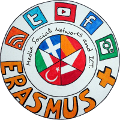An
unforgettable “European” week
by Antonia Gremi-Liadi, Greece
ERASMUS +: First meeting in Greece
Our school
participates this year for the first time in an ERASMUS+ student exchange
program. After a first meeting of the teachers in Istanbul in November, it was
Greece’s turn to host the first groups of guests. So, from the 7th
to the 13th of February, our school in Velo, Greece, hosted four
children from each partner country (Italy, Spain, Turkey, Poland-Latvia)
The first
meeting at the airport was a little awkward, but in just a few minutes the ice
broke, as every Greek child met with their assigned guest. The entire Greek
group had come by bus to welcome the visitors. We had prepared welcome banners
for each country in their own language, which made everybody feel comfortable.
On Monday our
guests had a short tour of the school, where they met the rest of the teaching
staff, and then we went on our first educational excursion. First, we visited
the ancient theater of Epidaurus, where Greek students presented to their guest
an extract from the ancient tragedy “Helen” by Euripides. Then we went to
Nafplio for lunch. On Tuesday afternoon we made a short trip to Xylokastro, a
pretty town by the sea, and we were shown to the house of an important Greek
poet, Aggelos Sikelianos.
On Wednesday,
we went on another trip to Athens. We were guided to the Acropolis Museum and
the Parthenon. We had the opportunity to show our new friends the Monastiraki
flea market, the ancient agora in Thissio and the Greek Parliament. Also, we
witnessed the change of the National Guard, the famous “Tsoliades”, who guard
the Greek Parliament and the monument devoted to all the “Unknown Soldiers” who
have sacrificed themselves fighting for freedom.
On Tuesday
and Thursday mornings, the students worked in mixed groups in our school
library to complete the programmed activities. We presented the results of a
survey concerning the habits of students and teachers in using the media and
the social networks and we joined in a discussion about the pros and cons of
ICT as an introduction to the next objective of the program, which is to create
a Safe Media Using Guide. We also prepared videos of our trips and excursions
and talked about the experiences we shared. On Thursday afternoon we had a
traditional celebration with dances from all partner countries and "Greek souvlaki"
in the school yard. Each country presented their own traditional dances and we
all had fun together.
On Friday we
visited Ancient Corinth. There we played an educational game. Greek students
were standing in pairs in front of some monuments, pretending to be local
ancient Corinthians. The rest of the students – Greeks and visitors – pretended
to be travelers from the future trying to return to their time. After taking
some information about the monuments from the locals, they were also given an
envelope with the letters of the secret code that would be the key for them to
travel back to the future. We all met at the centre of the ancient site, where
Saint Paul once stood trial in front of the Roman Governor in his passage
through Corinth. There, we joined all the letters and the secret code that
linked the past with the present was the Greek word “AGORA” and the Latin word
“FORUM”, which basically both mean the same thing “a meeting place where people
come together and talk”. After that, we went to Modern Corinth, where we
visited a local TV station and were interviewed by a reporter. On Friday
afternoon we had an open farewell party for our new friends with lots of food
and dancing, where the entire school was invited.
The time of
separation, on Saturday morning, was full of emotion and sadness, since most of
us might not see each other again. We have grown very fond of each other and we
shared beautiful moments of fun. Everybody admitted that it was a memorable and
powerful experience.
The next trip is scheduled for Easter in Poland.




















